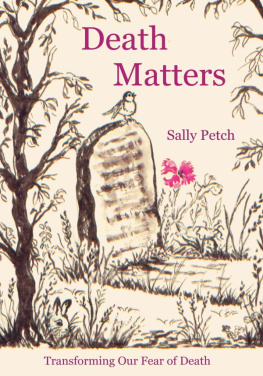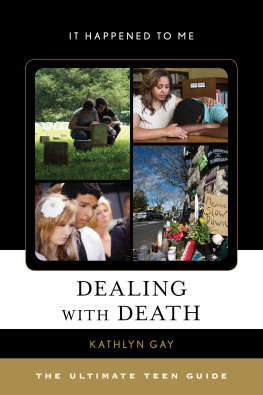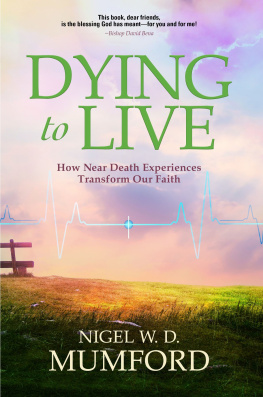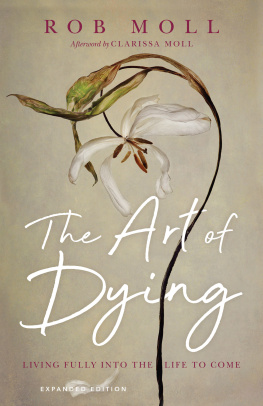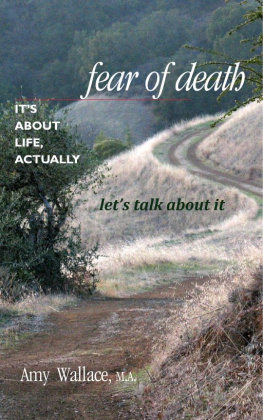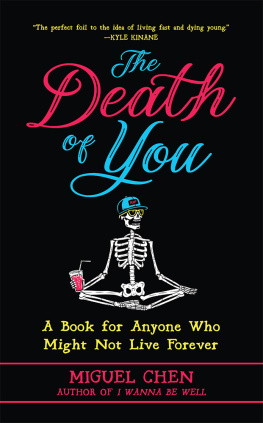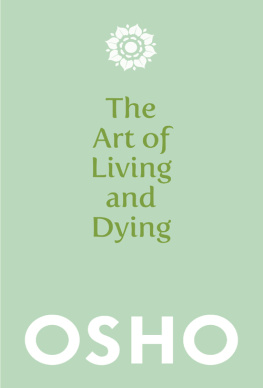Sally Petch lives in rural West Sussex overlooking a
churchyard. As well as writing, she runs a reflexology
and Flower Essence practice. She is passionate about
wildlife, drawing and walking beach labyrinths, and
mugs of Assam tea. She can be contacted via her website
www.deathmatters.co.uk
Also by Sally Petch
Gordons Gifts
Copyright 2013 Sally Petch
The moral right of the author has been asserted.
Apart from any fair dealing for the purposes of research or private study, or criticism or review, as permitted under the Copyright, Designs and Patents Act 1988, this publication may only be reproduced, stored or transmitted, in any form or by any means, with the prior permission in writing of the publishers, or in the case of reprographic reproduction in accordance with the terms of licences issued by the Copyright Licensing Agency. Enquiries concerning reproduction outside those terms should be sent to the publishers.
Matador
9 Priory Business Park,
Wistow Road, Kibworth Beauchamp,
Leicestershire. LE8 0RX
Tel: (+44) 116 279 2299
Fax: (+44) 116 279 2277
Email:
Web: www.troubador.co.uk/matador
ISBN 978 1780883 212
British Library Cataloguing in Publication Data.
A catalogue record for this book is available from the British Library.
Typeset in 11pt Adobe Garamond Pro by Troubador Publishing Ltd, Leicester, UK
Printed and bound in the UK by TJ International, Padstow, Cornwall

Matador is an imprint of Troubador Publishing Ltd

This one is for you SM.
Far ahead of the Indian trackers, halo gleaming softly.
Death Matters, because twinned with birth, it is universally experienced by every living thing.
Death Matters is a book filled with thoughts, anecdotes, shared experiences and tasks to help us to accept and feel more comfortable with our own journey towards death.
I N THE early 1960s, I caught pneumonia. I remember my father going out to collect the village doctor who was unable to drive as he had lost his licence due to drink driving. He stood in the hallway after examining me and I heard him tell my mother that that night would be the turning point one way or another. I knew what he meant; death was a possibility, and yet I felt a detachment from fear and also intuitively knew that this wasnt my time to die.
Then in my teens I suffered from pleurisy. I was aware of lying in my bed, fighting for my breath, when suddenly I floated up above my body and looked down upon myself.
I knew something rather strange had happened but I can remember being quite unperturbed and, if anything, the whole experience had been simple and quite pleasurable. I calmly told my sister what had occurred and her reaction was very different to mine!
During a kinesiology session, in my early forties, my therapist, as she was muscle testing, suddenly stated, Youre not afraid of death and dying at all. This was a pivotal moment because, until that point, I hadnt really given it any consideration. Since then, rather than shunning talk of death and dying, I have found it easy to embrace the concept, and to explore its meaning in respect of my beliefs.
In so doing it has made me very aware that not only do I seem to be in a minority, but that it is a subject which makes people very uncomfortable.
Death is nothing at all. So begins the famous eulogy by Canon Henry Scott Holland, but I have come to find that it is just the opposite for so many people in the Western world. It is everything, and our fear of it stops us from ever really living; as a society we go to great lengths to avoid anything to do with death or dying.
Many of my friends and clients have asked who I think will actually want to read a book about death. Doesnt it make you depressed spending so long writing about such a subject they ask? I can honestly say it doesnt. Death is as much a part of life for me as eating and sleeping, and I have long since lost any fear of openly talking about it, if indeed I ever had any.
As I scan magazine articles, internet features, and catch television adverts it has become clear to me that we are obsessed with remaining youthful in almost every aspect.
To grow old gracefully as a statement allows us to admit that we are going to die and it brings us closer to what we are so afraid to face. In fact our fear is sometimes so monumental that I am aware many people shy away from ever looking at death or talking about it until it is too late.
We sanitize it, talking about death in euphemisms like: Hes passed away. We use funeral directors to whisk away our dead, where they are laid out, and dressed in clothes they would have worn when alive. Every last detail is seen to for us so that we can remain apart.
Largely the days have passed when the coffin would remain in the house, when tales would be told around it, when the women of the house or close friends would lay out and wash the body. Death then was a part of life and was treated as such.
Instead we now live in a society that is rich in consumerism and choice, and it appears unthinkable that we are not able to defeat death, that we cant buy ourselves immortality.
Its certainly not for the want of trying. We spend billions on research into diseases.
Medical expertise and surgical operations to keep us here on Planet Earth are becoming the norm and there is constant discussion as to how to grow the bank of organ donors.
Stem cell research is advancing and the USA has a growing number of people opting for cryogenic freezing.
We are obsessed with saving lives as one day it could be our own which needs attention.
We react strongly to news of deaths or disasters, particularly if the casualty was young.
We call it a tragedy and feel the loss as fear. And then as thankfulness that it wasnt us or a loved one, this time.
But it will be us one day and it will be one of our loved ones or a pet or a neighbour or friend. It is a life certainty.

W ITHIN THESE pages are many thoughts and ideas about death and loss. They will act as starting points for discussion, because it is only by talking about death, and in particular our own death, that we will begin to conquer our inherent fear of it and that of our own passing.
There are contributions included from people who have already been touched in some way by death and who have chosen to share their wisdom with you.
There are also reflection points throughout and I would suggest that you keep a journal specifically for recording your thoughts as you work through the book.
The first one is coming up right away.
What drew you to reading this book? Whats going on in your life right now that has made you more receptive to the idea of looking at death as a necessary subject for discussion and reflection?
C ONSIDER THIS. Would we not plan a special birthday, an anniversary or a seasonal celebration? Then why do we not plan our own death with as much care and attention to detail? Is the celebration of our life not worthy of such preparation?
Write in your journal how you feel about this at this moment. If you strongly disagree then that is absolutely fine but try to write down why.
What have you celebrated recently? What did you do? Who with? Try to describe the occasion in detail.
If you havent celebrated anything for a long time ask yourself the question why?
A gentle and non-challenging starting point is to look at how you, your family and friends celebrate seasonal changes and festivals because they
Next page
